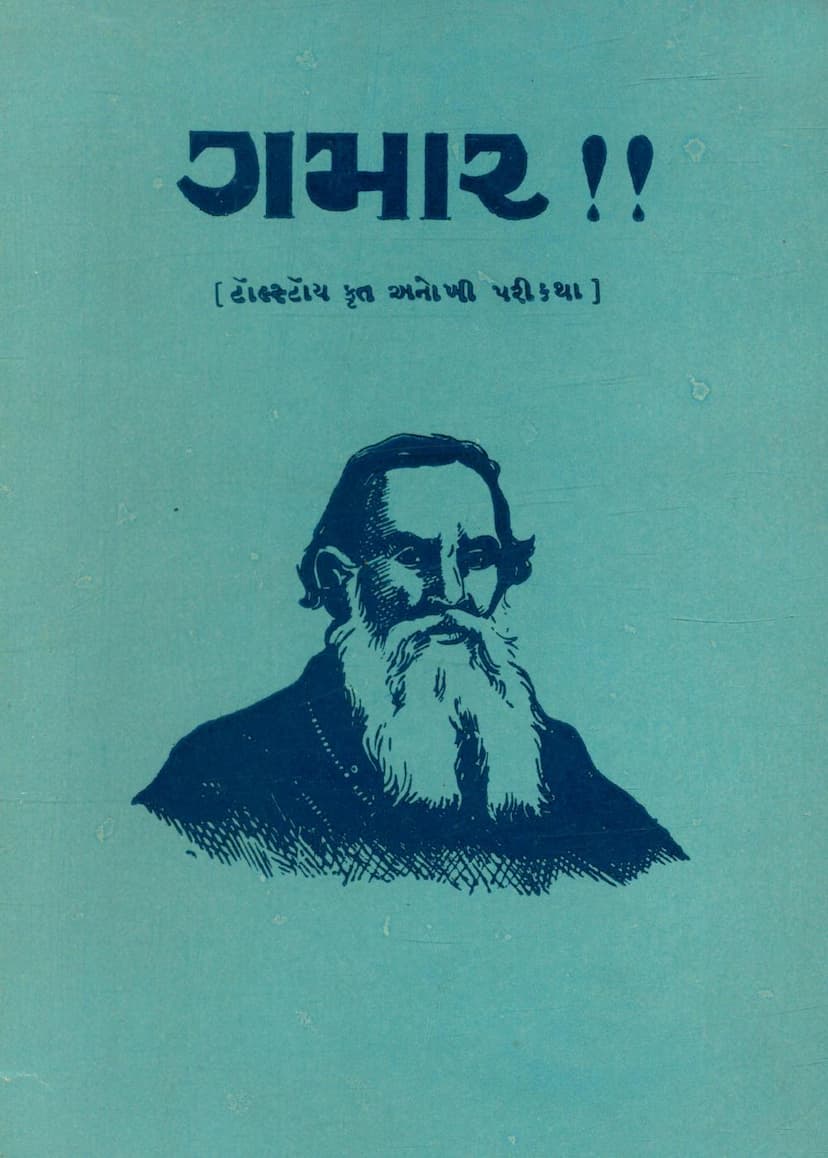Gamar
Added to library: September 1, 2025

Summary
Here's a comprehensive summary of the Jain text "Gamar" by Gopaldas Jivabhai Patel, based on the provided pages:
Book Title: Gamar (ગમાર) Author: Gopaldas Jivabhai Patel (ગopાળદાસ જીવાભાઈ પટેલ) Publisher: Acharya J B Krupalini & Maganbhai Desai Memorial Trust (આચાર્ય શ્રી જે. બી. કૃપલાની અને મગનભાઈ દેસાઈ મેમોરિયલ ટ્રસ્ટ)
Overview:
The book "Gamar" appears to be a Gujarati translation and adaptation of Leo Tolstoy's allegorical fairy tale, likely titled "Ivan the Fool" or a similar concept, presented within a broader socio-political and spiritual context by Gopaldas Jivabhai Patel. The text critiques the prevalent Western materialistic and technologically driven "hedonistic culture" (ભોગેશ્વર્ય-સંસ્કૃતિ) that prioritizes brute force, warfare, and the accumulation of wealth by a few, leading to the exploitation and impoverishment of the masses. It champions a return to simpler, labor-intensive living, exemplified by Gandhi's emphasis on the charkha (spinning wheel) and "bread labor" (bread earned through manual work).
Key Themes and Arguments:
-
Critique of Western Materialism and Militarism: The preface and early pages vehemently criticize the influence of Western scientific technology and its materialistic culture, which they believe has led to war, exploitation, and societal decline. The authors draw parallels between historical periods of oppression in India (Muslim invasions, British rule) and the current global reliance on military might and technological advancement, which they deem "demonic" and "hedonistic."
-
The "Gamar" (Fool) as a Symbol of True Wisdom: The story centers around Ivan, the youngest of three brothers, who is considered a "Gamar" (simpleton, fool) by his family and society. Unlike his brothers, Simon (who joins the army) and Taras (who becomes a shrewd merchant), Ivan is a simple farmer who engages in manual labor and shows kindness and compassion. The narrative suggests that Ivan's perceived foolishness is actually a form of wisdom, innocence, and adherence to ethical principles, contrasting sharply with the worldly cunning and greed of his brothers.
-
Critique of Modern Governance and Economics: The later chapters detail the actions of Simon and Taras after they become kings. Simon builds a powerful military, engaging in constant warfare, leading to his eventual defeat by a technologically advanced Indian king. Taras focuses on amassing wealth through trade and taxation, creating a system where his wealth thrives but the people suffer, eventually leading to his economic downfall.
-
Ivan's "Foolish" Rule: Ivan, after unexpectedly becoming king, embodies a radically different approach to governance. He dismisses traditional symbols of royalty, prefers manual labor, and lives a simple life with his family. His economic policies are based on communal well-being rather than accumulation. When faced with challenges or requests, his "foolishness" often leads to outcomes that benefit the common good or expose the absurdity of materialistic pursuits.
-
The Role of "Gothiya" (Demons/Agents of Evil): The story introduces "Gothiya" (likely representing demonic influences or agents of discord) who are tasked by "Butto Satan" to sow discord among the brothers. These demons attempt to ruin Simon and Taras, but their schemes are thwarted or redirected by Ivan's inherent goodness and the consequences of his brothers' actions.
-
The Contrast of Values: The core message is a stark contrast between two sets of values:
- Simon: Military might, conquest, brute force.
- Taras: Material wealth, trade, profit, exploitation.
- Ivan: Manual labor ("bread labor"), honesty, kindness, simplicity, community well-being, contentment.
-
Tolstoy's Philosophy and Gandhi's Legacy: The text explicitly links Tolstoy's ideas on non-violence and simple living to Mahatma Gandhi's philosophy and actions. Gandhi's translation of a similar Tolstoy work is mentioned, highlighting the shared critique of militarism and materialism. The book suggests that India, after gaining independence, has unfortunately reverted to the Western model of militarism and technological advancement, moving away from Gandhi's ideals.
-
A Call for a Simpler Life: The overarching message is a call for a return to a simpler way of life, grounded in honest labor, ethical conduct, and spiritual values, as opposed to the destructive pursuit of material wealth and military power. The "Gamar" is presented not as someone lacking intelligence but as someone possessing a higher, more spiritual form of wisdom that understands true well-being.
Narrative Structure:
The book is structured into chapters that follow the lives of the three brothers. It details their early lives, their brothers' schemes to undermine them, their rise to power, their reigns, and ultimately, the triumph of Ivan's simple, ethical approach, even as his brothers fall due to their flawed values.
In essence, "Gamar" argues that true prosperity and peace lie not in military conquest or material accumulation, but in simple living, honest labor, and spiritual integrity, as embodied by the seemingly foolish Ivan. The text serves as a critique of modern society's priorities and a powerful advocacy for a return to fundamental human values.